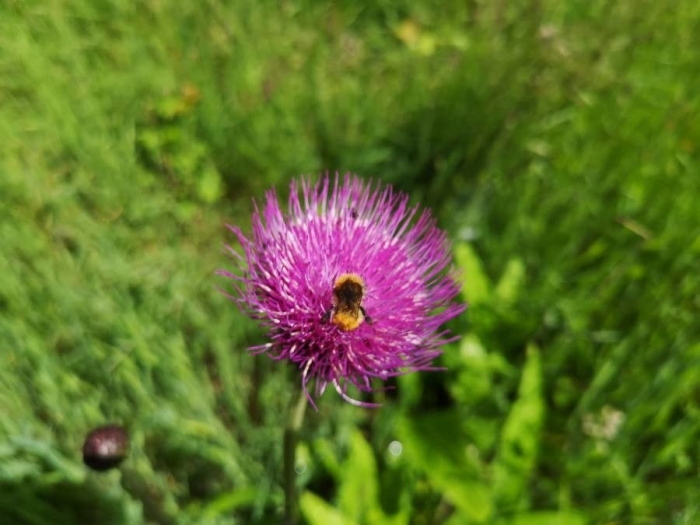Plume Thistle
(Cirsium rivulare)
Plume Thistle (Cirsium rivulare)
/
/

Nigel Nigel Voaden
CC BY-SA 4.0
Image By:
Nigel Nigel Voaden
Recorded By:
Copyright:
CC BY-SA 4.0
Copyright Notice:
Photo by: Nigel Nigel Voaden | License Type: CC BY-SA 4.0 | License URL: https://creativecommons.org/licenses/by-sa/4.0/ | Attribution: Nigel Nigel Voaden (cc-by-sa) | Rights Holder: Nigel Nigel Voaden | Publisher: PlantNet | Date Created: 2020-07-11T13:17:27Z | Title: Cirsium rivulare (Jacq.) All.: flower | Notes: |




















































Estimated Native Range
Summary
Cirsium rivulare, commonly known as Plume Thistle, is a deciduous perennial herb that is native to riparian zones, wet meadows, and marshes throughout Europe. It can reach a height of 1.5 meters (4.9 feet) and forms a clump with narrow, grey-green prickly leaves. The Plume Thistle is notable for its small purple globular flowerheads that bloom in early to midsummer, adding a touch of color to the garden. The flowers are particularly attractive to pollinators such as bees and butterflies.
This plant is valued for its striking flowerheads and its ability to thrive in moist conditions, making it a popular choice for water gardens, bog gardens, and as a border plant in areas with consistent moisture. The cultivar ’Atropurpureum’, with its deep crimson flowers, has been recognized with the Royal Horticultural Society’s Award of Garden Merit, indicating its exceptional qualities in garden settings. Plume Thistle is very hardy, tolerating temperatures down to at least −20 °C (−4 °F), and it prefers full sun exposure. It requires high amounts of water and grows best in soils with medium drainage. While it is generally low-maintenance, gardeners should be aware that it can self-seed and spread if not managed, potentially becoming invasive in some areas.CC BY-SA 4.0
This plant is valued for its striking flowerheads and its ability to thrive in moist conditions, making it a popular choice for water gardens, bog gardens, and as a border plant in areas with consistent moisture. The cultivar ’Atropurpureum’, with its deep crimson flowers, has been recognized with the Royal Horticultural Society’s Award of Garden Merit, indicating its exceptional qualities in garden settings. Plume Thistle is very hardy, tolerating temperatures down to at least −20 °C (−4 °F), and it prefers full sun exposure. It requires high amounts of water and grows best in soils with medium drainage. While it is generally low-maintenance, gardeners should be aware that it can self-seed and spread if not managed, potentially becoming invasive in some areas.CC BY-SA 4.0
Plant Description
- Plant Type: Herb
- Height: 1-4 feet
- Width: 1-4 feet
- Growth Rate: Moderate
- Flower Color: Purple
- Flowering Season: Summer
- Leaf Retention: Deciduous
Growth Requirements
- Sun: Full Sun
- Water: High
- Drainage: Medium
Common Uses
Bee Garden, Bird Garden, Butterfly Garden, Hummingbird Garden, Low Maintenance
Natural Habitat
native to riparian zones, wet meadows, and marshes throughout Europe
Other Names
Common Names: Brook Thistle, Bäcktistel, Bach-Kratzdistel
Scientific Names: , Cirsium rivulare, Cnicus rivularis, Cirsium salisburgense, Cirsium tricephalodes, Cirsium semipectinatum, Cirsium erisithales subsp. rivulare, Carduus rivularis, Cirsium siegerti, Cnicus salisburgensis
GBIF Accepted Name: Cirsium rivulare (Jacq.) All.